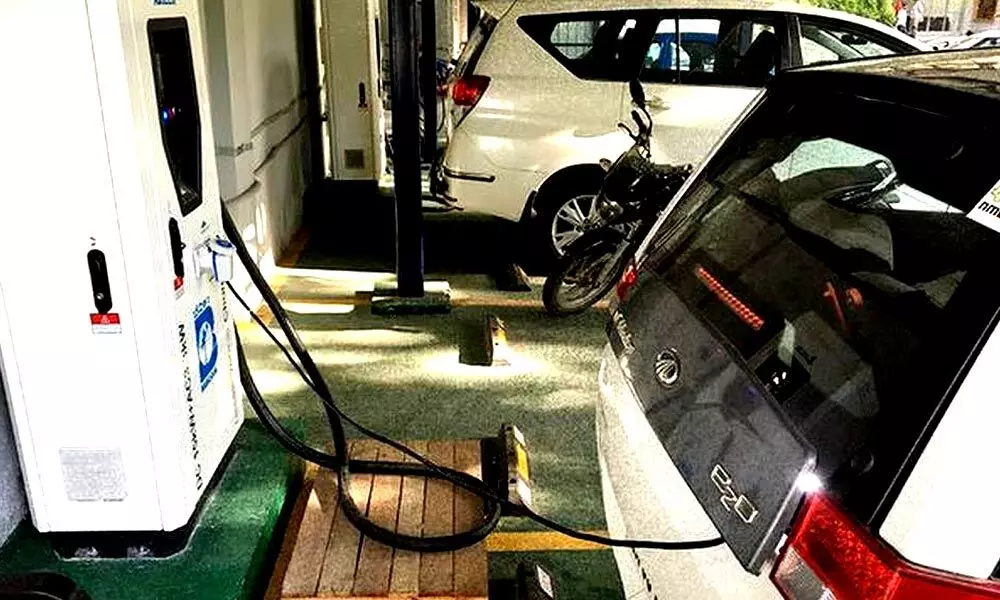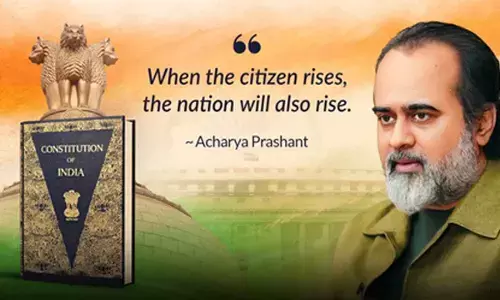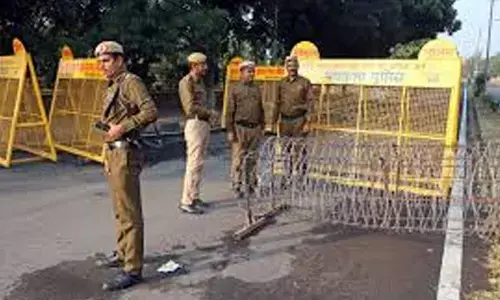The Network System Of Bengaluru's Electrinic Vehicles Has Been Enhanced

An electric car charging station in Bengaluru. (Photo/thehindu)
- The world's third-largest emitter of greenhouse gases, has a transportation sector that accounts for 10% of total national GHG emissions, with road transportation accounting for 87 percent of that total.
- Due to factors such as demography, income levels, policy and regulatory settings, and urbanisation the Indian electric car market varies substantially per state.
This industry contributes for one-fourth of global greenhouse gas emissions, according to the Intergovernmental Panel on Climate Change (IPCC).
India, the world's third-largest emitter of greenhouse gases, has a transportation sector that accounts for 10% of total national GHG emissions, with road transportation accounting for 87 percent of that total. One strategy to reduce pollution is to use electric cars (EVs). While the Indian government has announced a number of legislative efforts, state-level policy implementation is crucial for EV adoption. Due to factors such as demography, income levels, policy and regulatory settings, and urbanisation the Indian electric car market varies substantially per state.
Karnataka was the first Indian state to enact the Electric Vehicle and Energy Storage Policy in 2017,which aimed to increase EV sales and establish charging infrastructure. By 2030, the state's EV programme plans to convert half of its public transportation fleet to electric vehicles. The government has also stated that Bengaluru will be designated as India's EV capital.
As a result, as of September 2021, Bangalore Electricity Supply Company Limited (BESCOM), the nodal agency for EV growth, has established EV charging stations at 74 places and deployed 136 EV chargers. Higher EV penetration, on the other hand, may offer grid destabilisation threats due to its spatial and temporally unpredictable character, creating substantial peaks when residential peak demand coincidesThis industry contributes for one-fourth of global greenhouse gas emissions, according to the Intergovernmental Panel on Climate Change (IPCC).
India, the world's third-largest emitter of greenhouse gases, has a transportation sector that accounts for 10% of total national GHG emissions, with road transportation accounting for 87 percent of that total. One strategy to reduce pollution is to use electric cars (EVs). While the Indian government has announced a number of legislative efforts, state-level policy implementation is crucial for EV adoption. Due to factors such as demography, income levels, policy and regulatory settings, and urbanisation the Indian electric car market varies substantially per state.
Karnataka was the first Indian state to enact the Electric Vehicle and Energy Storage Policy in 2017,which aimed to increase EV sales and establish charging infrastructure. By 2030, the state's EV programme plans to convert half of its public transportation fleet to electric vehicles. The government has also stated that Bengaluru will be designated as India's EV capital.
As a result, as of September 2021, Bangalore Electricity Supply Company Limited (BESCOM), the nodal agency for EV growth, has established EV charging stations at 74 places and deployed 136 EV chargers. Higher EV penetration, on the other hand, may offer grid destabilisation threats due to its spatial and temporally unpredictable character, creating substantial peaks when residential peak demand coincides.
Due to high harmonics and voltage imbalances, EVs may have an impact on power quality in the electricity distribution network. Due to overloading and harmonic injection, they could put additional strain on distribution transformers (DTs).
According to an India Smart Grid Forum assessment for twelve 11kV feeders in Bengaluru, considerable upgrades to the DTs (with 100 kVA or more capacity) and cables, as well as filter installation to alleviate harmonics concerns, are required for smooth integration of the EV demand. BESCOM is already dealing with regular power outages, so adding more load in the form of EVs could exacerbate the problem. As a result, a flexible and reliable distribution infrastructure is a must before any large-scale EV deployment.
This could be supplemented by implementing a time-of-day tariff for Bengaluru EV owners, incentivizing lower charging tariffs during off-peak hours and discouraging higher charging tariffs during peak hours. BESCOM will have to make major expenditures to modernise its traditional grid for a smooth transition to e-mobility, in addition to having a solid charging infrastructure that includes accessibility, profitability, and a time-of-use-based pricing.
Because Bengaluru is also a popular location for solar rooftop photovoltaic (RTPV) installations, EV adoption can be fueled by RTPV adoption and vice versa. BESCOM can promote solar-powered EV charging as a cost-effective alternative to grid electricity due to falling RTPV costs.
For both distributors and consumers, this might be a win-win situation.
Karnataka may be able to meet its 2030 EV ambitions if it takes advantage of its RTPV potential and invests in excellent distribution infrastructure. It has the potential to be a leader in merging electric vehicles with renewable energy sources and building a pan-India business strategy.
















